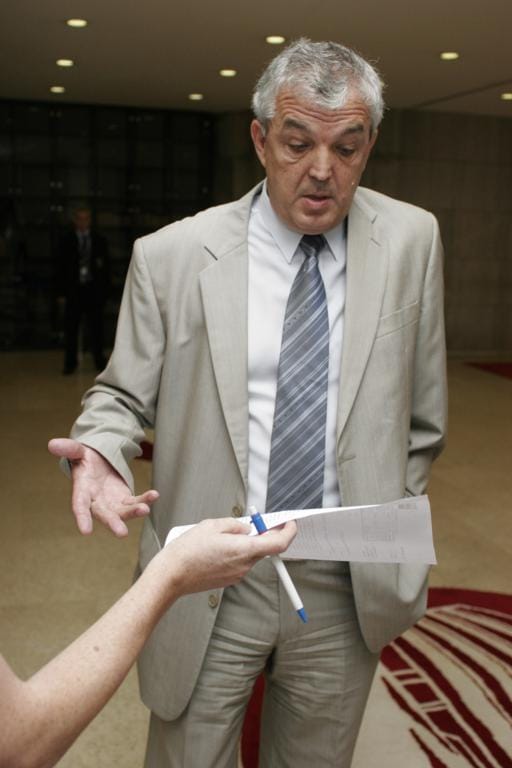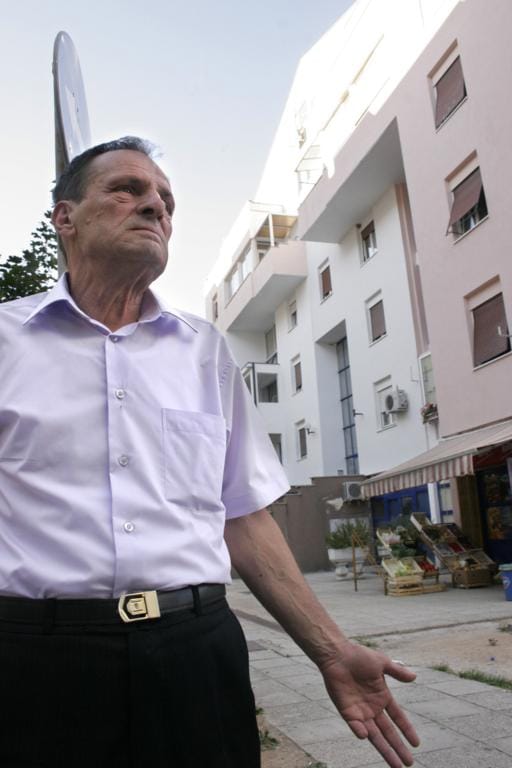The heads of Čapljina municipality, mainly members of Croatian Democratic Union (HDZ), decided to give to their party colleague Dragan Vrankić, the current minister of finance and treasury of Bosnia-Herzegovina, 65,000 KM to buy an apartment. The money came from Čapljina Reconstruction Fund while the apartment is in the neighboring Mostar.
The money was paid to an account of a construction company, Tempo-Vranica.
These details minister Vrankić has not reported in his assets card. True, there is no field to be filled with the details on the origin of property. Not that he was accurate when it comes to his other assets. Certain property has been omitted that Vrankić had reported with the BiH Central Election Commission (CIK) in August 2006 when he intended to make it into the BiH Parliament’s House of Representatives on the HDZ ticket, nor was it declared in the statement he filed four months later, as a nominee for the state minister. That statement is checked by State Investigation and Protection Agency (SIPA).
In the second statement he said that the information is complete, truthful and accurate and he declared it ‘under full material and ethical responsibility.’

According to information that Center for Investigative Reporting in Sarajevo (CIN) has acquired, Vrankić did not provide the size and the value of the Mostar apartment. He omitted that he has a garage. He also omitted reporting that he has a private estate in Trebižat near Čapljina. He reported owning a weekend house under construction, but did not say where it was. An illegal dwelling in his name is registered in Blidinje near Jablanica. Not filing accurately can be considered giving a false statement under BiH Criminal Law.
Vrankić passed a nomination screening procedure for the state minister of finances and treasury and receives around 5,500 KM a month in his own admission.
According to Centres for Civil Initiatives (CCI), minister Vrankić received a net salary 4,850.46 KM in June of 2009. In addition, he received 400 KM for living away from family and 187.20 KM in mean allovance. Along with this, the ministers’ cell phone bills are paid, per diems, hospitality costs, and other perks like a personal driver.
In his assets card Vrankić has reported an apartment worth 80,000 KM and 80 square meters in area. A contract shows a two-room apartment in Mostar, at the address of Akademika Ivana Zovke, 91.02 square meters in area, priced at 128,122.40 KM. Vrankić confirmed to CIN that this was the same apartment, but he didn’t explain why he had decreased the apartment’s value and area.
The contract on the advance payment for the procurement of the apartment Vrankić signed with the construction company Vranica from Mostar on July 24, 1998. The next month, on August 26, 1998 the keys to the apartment were transferred to him. Vrankić was the deputy minister of finance of Herzegovina-Neretva Canton with headquarters in Mostar.
At least 65,000 KM out of the total sum for the apartment was not paid by Vrankić. This amount was paid by the taxpayers instead of him, that is, the Municipality of Čapljina where Vrankić was born and where he worked for a while as a municipal official. The money was wired via Čapljina Reconstruction Fund on June 23, 1998, a day before the bill of sale between Vrankić and Vranica was signed.
At the head of this municipality were Vrankićs’ party colleagues. The then mayor of Čapljina, Krunoslav Kordić, said that the money was paid to resolve the housing issues of Čapljina officials, even though Vrankić at that time worked in Mostar, not in Čapljina.
‘Well, nowhere does it say that … uhm, an apartment should be here or there … this was since he was living there at the moment’ said Kordić to CIN. He added that Vrankić ‘kept his slot’ in the municipality.
‘It is only so natural that he wanted to keep his place … to come back the next day …. (If) he wouldn’t make it at the elections, he’d be nowhere. Of course he wanted to keep his position and it is normal that he was a staffer of Čapljina municipality’ said Kordić.
In a written response to CIN, Vrankić said that as an officeholder from Čapljina he had an ‘obligation to serve on the cantonal government.’ He said that, during that time, the passage through downtown Mostar was often closed, and that he had trouble coming to work. ‘Hence a decision of the Čapljina Reconstruction Fund to help me get to work’ said Vrankić.
In the municipality’s official gazettes from the time, there was no record on setting up the Fund, nor the criteria for doling out money, nor any records who else, except Vrankić, received money to settle his or her housing. People CIN talked to could not recall any details, or they did not want to discuss them, while the current Mayor Smiljan Vidić, Vrankić’s party colleague, declined to provide more information.
According to the Financial Police of Federation of BiH (FBiH) Vrankić paid 9,125 KM, while the rest of the money was paid by the Mostar office of the Bank of Dubrovnik from the loan Vrankić took.
The FBiH Financial Police, which conducted an investigation into Vrankić’s apartment, finds that loan questionable. According to data on the receipts dated February 11, 1998, the bank wired 64,061.20 KM to Vranica intended as a ‘payment according to an advance payment contract for the procurement of the apartment ID 24/98 dated February 10, 1998 from Dragan Vrankić’s loan’. The contract number is correct, but not the date of signing. The contract was signed on July 24, 1998 . Apart from this, the sum was balanced five months before the advance payment contract for the procurement of apartment was signed.
The contradictory dates? The minister says that there could be an error in Vranica’s financial books.
The Financial Police asked for the paperwork on the loan from Hypo Alpe Adria bank, which is a legal successor to the Dubrovnik Bank. Petar Jurčić, the bank’s director, refused to disclose these records without an order from the FBiH Minister of Finance. At the time, the minister of finance was Vrankić. In his reply to the police on October 23, 2003, Jurčić said that ‘the loan files of the persons are kept—depending on the type of loan—at most for five years following the final payment of the loan and the said time frame has expired in the middle of the year.’ This means that Vrankić returned a loan in 1998, the same year when he took it.
As opposed to the bank official’s response, Vrankić said that he’s been paying the loan back for 10 year. ‘I took a loan from the Dubrovnik Bank in 1998 on 10 years and it was paid off’ said Vrankić.
At CIN’s request to give us paperwork about this, he replied: ‘I gave you what I thought that you should get.’
In his 2006 assets card, Vrankić also reported a 25,000 KM loan due in 2014 .
Questionable apartment
The same year Vrankić bought a garage of 16.80 square meters from Vranica worth 8,316 KM in the same building where his apartment is. However, the garage is mentioned nowhere in the assets cards.

Even though the land records in Mostar attribute this apartment to Vrankić, a resident of Mostar,Mehmed Bošnjić, said the apartment in question actually belongs to him and not to the minister. Bošnjić received this apartment in May 1989 from his company, Aluminij.
Jure Musa, an advisor to the Aluminij director, said that Bošnjić’s apartment is one of 30 that the company bought in the ‘80s for its employees. He said the company made an advance payment for their construction which was stopped by the war. After the war, the company did not have the money to pay for completion of apartments in construction.
‘We have given up on about 20 apartments, among which was the apartment intended for Mr. Bošnjić. That is how the apartment ended in the real estate market’ said Musa.
Since 2004 Bošnjić has been trying to settle the ownership.
Even though the civil case has been going on for years, Bošnjić believes in justice and hopes for a positive outcome. ‘Everything points in my favor, but the apartment is still beyond my reach’ said Bošnjić.
His wife Dževada said: ‘I’m not going to give up even if I had to spend the last penny on it and took loans and all. I’ve got all the paperwork and the law is on my side.’
In a written response, Vrankić wrote to CIN: ‘If there is a court case between some individuals, Aluminij and Vranica , that is not my problem. Whatever happens, my property rights must be protected.’
Still, he asked through a lawyer to be involved in the ongoing court case because he’s an interested party.
Illegal weekend house
In his 2006 assets card Vrankić reported owning a weekend house under construction worth 50,000 KM. CIN learned that a 42-square-meter weekend house is located in the protected zone of Blidinje nature park, near Jablanica. It has not been entered into land records in Konjic, because it was built illegally.
‘Now, this is in the process, and applications for construction permits have been submitted not only for my building but for the whole area of Blidinje’ wrote Vrankić in his response to CIN.
In his August 2006 assets card, Vrankić claimed 30,000 KM of savings. Just six months later, in a response to Commission for Preparation of Appointment of BiH Council of Ministers, he reported savings of 83,000 KM.
‘It almost takes magician’s powers to save 50,000 KM in a year with this salary. Really. Unless… your wife has a good job and a good salary, and no children’ said Halid Genjac, president of the Commission.
Vrankić responded to CIN that the money came from the return of the private loan. He did not mention that he lent money to anyone in his assets card.
According to 2006 assets card, his wife, Dragana, at the time had an annual salary of 15,000 KM, and office space in Čapljina worth 50,000 KM. Their children Ana, Zdravo and Marin were reported to have no revenues or assets.
In his assets card Vrankić reported that his father, Tomo Vrankić, has a family house worth 150,000 KM, and a private estate worth 100,000 KM to which he said has a right of inheritance since they live in the same household. However, Vrankić failed to declare his own private estate in Čapljina.
According to records that CIN found in the land records, Dragan Vrankić is the owner of land, a house, courtyard and meadows of 747 square meters in Trebižat, near Čapljina, which he received as a gift in February 15, 1983. He also owns 2,125-square-meter of meadows and farm land in Trebižat.
Dragan Vrankić drives a Volkswagen Tiguan. It’s a new model whose price ranges from 53,000 to 70,000 KM with full gear.

DATABASE – Politicians’ Assets







